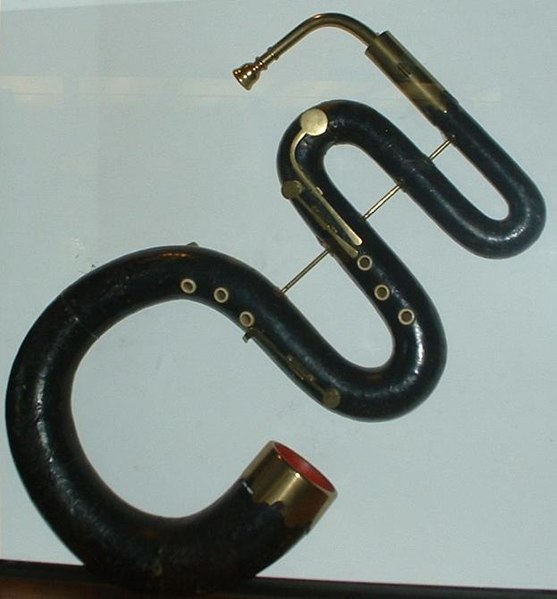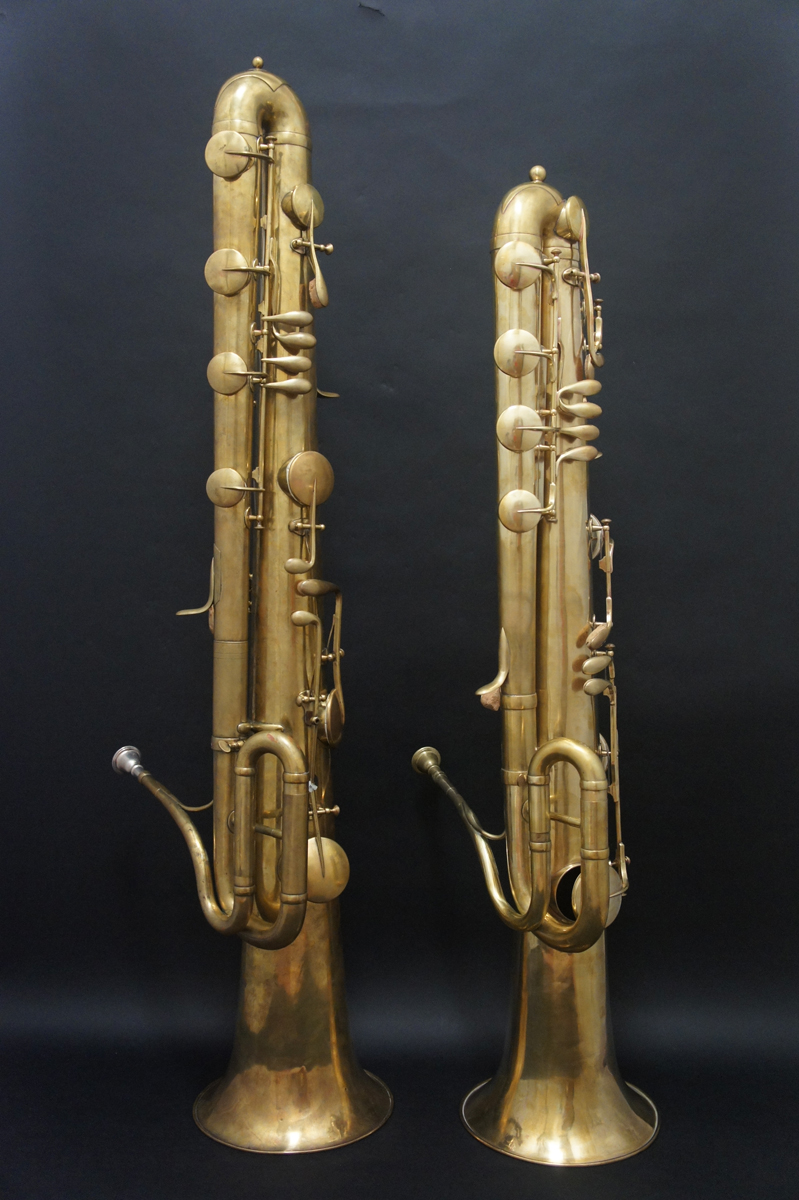Ok, the math/music bit is taking some time to write, so let& #39;s talk about weird musical instruments.
Welcome to the world of keyed brass instruments, this is a serpent (& #39;snake& #39; in French) https://abs.twimg.com/emoji/v2/... draggable="false" alt="👇" title="Rückhand Zeigefinger nach unten" aria-label="Emoji: Rückhand Zeigefinger nach unten">
https://abs.twimg.com/emoji/v2/... draggable="false" alt="👇" title="Rückhand Zeigefinger nach unten" aria-label="Emoji: Rückhand Zeigefinger nach unten">
It plays with a brass mouthpiece, but has holes and/or keys...
(1/n)
Welcome to the world of keyed brass instruments, this is a serpent (& #39;snake& #39; in French)
It plays with a brass mouthpiece, but has holes and/or keys...
(1/n)
Its origin is unclear: a source from 1743 dates it back to 1590, as an invention of Canon Edmé Guillaume.
It is very likely that it evolved or was inspired by the cornett (not to be confused with & #39;cornet& #39; a valved brass instrument)
(2/n)
https://en.wikipedia.org/wiki/Cornett ">https://en.wikipedia.org/wiki/Corn...
It is very likely that it evolved or was inspired by the cornett (not to be confused with & #39;cornet& #39; a valved brass instrument)
(2/n)
https://en.wikipedia.org/wiki/Cornett ">https://en.wikipedia.org/wiki/Corn...
The serpent was used in military bands and in orchestras, and also came to be associated with church music.
Here& #39;s a satirical drawing of a priest playing a serpent from the musée Carnavalet:
(3/n)
Un Serpent de Paroisse. | Paris Musées https://www.parismuseescollections.paris.fr/fr/musee-carnavalet/oeuvres/un-serpent-de-paroisse#.XvIvwYTgBZk.twitter">https://www.parismuseescollections.paris.fr/fr/musee-...
Here& #39;s a satirical drawing of a priest playing a serpent from the musée Carnavalet:
(3/n)
Un Serpent de Paroisse. | Paris Musées https://www.parismuseescollections.paris.fr/fr/musee-carnavalet/oeuvres/un-serpent-de-paroisse#.XvIvwYTgBZk.twitter">https://www.parismuseescollections.paris.fr/fr/musee-...
Holes do not work well on a brass instrument. This paper by Eveno and Le Conte measuring the acoustics of various keyed brass shows that as soon as holes are uncovered, the spectrum of the sound becomes inharmonic thus making it difficult to play..
(4/n)
https://doi.org/10.1016/j.culher.2016.02.005">https://doi.org/10.1016/j...
(4/n)
https://doi.org/10.1016/j.culher.2016.02.005">https://doi.org/10.1016/j...
With some experience, it can nevertheless be played and has a very characteristic sound. Here& #39;s a wonderful performance of XVIIIth century music on the serpent  https://abs.twimg.com/emoji/v2/... draggable="false" alt="👇" title="Rückhand Zeigefinger nach unten" aria-label="Emoji: Rückhand Zeigefinger nach unten">
https://abs.twimg.com/emoji/v2/... draggable="false" alt="👇" title="Rückhand Zeigefinger nach unten" aria-label="Emoji: Rückhand Zeigefinger nach unten">
Berlioz used it in his & #39;Symphonie Fantastique& #39; and said...
(5/n) https://www.youtube.com/watch?v=t9mB72TC8Kw">https://www.youtube.com/watch...
Berlioz used it in his & #39;Symphonie Fantastique& #39; and said...
(5/n) https://www.youtube.com/watch?v=t9mB72TC8Kw">https://www.youtube.com/watch...
& #39;If the serpent plays out of tune, as they almost always do, it can be replaced by an ophicleide& #39;
But what& #39;s an ophicleide ?? The name comes from the greek, and means & #39;a serpent with keys& #39;
Here& #39;s two https://abs.twimg.com/emoji/v2/... draggable="false" alt="👇" title="Rückhand Zeigefinger nach unten" aria-label="Emoji: Rückhand Zeigefinger nach unten">
https://abs.twimg.com/emoji/v2/... draggable="false" alt="👇" title="Rückhand Zeigefinger nach unten" aria-label="Emoji: Rückhand Zeigefinger nach unten">
(6/n)
But what& #39;s an ophicleide ?? The name comes from the greek, and means & #39;a serpent with keys& #39;
Here& #39;s two
(6/n)
It& #39;s the same principle, except the holes are now all covered by keys.
The ophicleides were a bit popular in the XIXth century, but had the same problems as the serpent, in that tone production was difficult and unreliable.
Berlioz again said: "in certain cases..."
(7/n)
The ophicleides were a bit popular in the XIXth century, but had the same problems as the serpent, in that tone production was difficult and unreliable.
Berlioz again said: "in certain cases..."
(7/n)
"...the ophicleide does wonder  https://abs.twimg.com/emoji/v2/... draggable="false" alt="🙂" title="Leicht lächelndes Gesicht" aria-label="Emoji: Leicht lächelndes Gesicht">, covered by masses of other brass instruments
https://abs.twimg.com/emoji/v2/... draggable="false" alt="🙂" title="Leicht lächelndes Gesicht" aria-label="Emoji: Leicht lächelndes Gesicht">, covered by masses of other brass instruments https://abs.twimg.com/emoji/v2/... draggable="false" alt="😐" title="Neutrales Gesicht" aria-label="Emoji: Neutrales Gesicht">"
https://abs.twimg.com/emoji/v2/... draggable="false" alt="😐" title="Neutrales Gesicht" aria-label="Emoji: Neutrales Gesicht">"
He went on:
"High-pitched notes have a raw character, that maybe hasn& #39;t been fully exploited yet. Medium range, especially when the musician is not experimented,..."
(8/n)
He went on:
"High-pitched notes have a raw character, that maybe hasn& #39;t been fully exploited yet. Medium range, especially when the musician is not experimented,..."
(8/n)
"... sounds too much like a serpent. It should not be left playing alone. (...) There& #39;s nothing more vulgar and monstrous than those passages for solo ophicleide in modern operas. It sounds like an escaped bull frolicking in the salon"
Well... https://abs.twimg.com/emoji/v2/... draggable="false" alt="😅" title="Lächelndes Gesicht mit offenem Mund und Angstschweiß" aria-label="Emoji: Lächelndes Gesicht mit offenem Mund und Angstschweiß">
https://abs.twimg.com/emoji/v2/... draggable="false" alt="😅" title="Lächelndes Gesicht mit offenem Mund und Angstschweiß" aria-label="Emoji: Lächelndes Gesicht mit offenem Mund und Angstschweiß">
(9/n)
Well...
(9/n)
I personally wouldn& #39;t be so harsh. Here& #39;s a example of solo ophicleide which sounds damn fine  https://abs.twimg.com/emoji/v2/... draggable="false" alt="👇" title="Rückhand Zeigefinger nach unten" aria-label="Emoji: Rückhand Zeigefinger nach unten">
https://abs.twimg.com/emoji/v2/... draggable="false" alt="👇" title="Rückhand Zeigefinger nach unten" aria-label="Emoji: Rückhand Zeigefinger nach unten">
The ophicleide disappeared at the end of the XXth century but you can still find vintage instruments as well as modern copies.
(10/10) https://www.youtube.com/watch?v=w5iNrYzceMQ">https://www.youtube.com/watch...
The ophicleide disappeared at the end of the XXth century but you can still find vintage instruments as well as modern copies.
(10/10) https://www.youtube.com/watch?v=w5iNrYzceMQ">https://www.youtube.com/watch...

 Read on Twitter
Read on Twitter It plays with a brass mouthpiece, but has holes and/or keys...(1/n)" title="Ok, the math/music bit is taking some time to write, so let& #39;s talk about weird musical instruments.Welcome to the world of keyed brass instruments, this is a serpent (& #39;snake& #39; in French)https://abs.twimg.com/emoji/v2/... draggable="false" alt="👇" title="Rückhand Zeigefinger nach unten" aria-label="Emoji: Rückhand Zeigefinger nach unten">It plays with a brass mouthpiece, but has holes and/or keys...(1/n)" class="img-responsive" style="max-width:100%;"/>
It plays with a brass mouthpiece, but has holes and/or keys...(1/n)" title="Ok, the math/music bit is taking some time to write, so let& #39;s talk about weird musical instruments.Welcome to the world of keyed brass instruments, this is a serpent (& #39;snake& #39; in French)https://abs.twimg.com/emoji/v2/... draggable="false" alt="👇" title="Rückhand Zeigefinger nach unten" aria-label="Emoji: Rückhand Zeigefinger nach unten">It plays with a brass mouthpiece, but has holes and/or keys...(1/n)" class="img-responsive" style="max-width:100%;"/>
 (6/n)" title="& #39;If the serpent plays out of tune, as they almost always do, it can be replaced by an ophicleide& #39;But what& #39;s an ophicleide ?? The name comes from the greek, and means & #39;a serpent with keys& #39;Here& #39;s two https://abs.twimg.com/emoji/v2/... draggable="false" alt="👇" title="Rückhand Zeigefinger nach unten" aria-label="Emoji: Rückhand Zeigefinger nach unten">(6/n)" class="img-responsive" style="max-width:100%;"/>
(6/n)" title="& #39;If the serpent plays out of tune, as they almost always do, it can be replaced by an ophicleide& #39;But what& #39;s an ophicleide ?? The name comes from the greek, and means & #39;a serpent with keys& #39;Here& #39;s two https://abs.twimg.com/emoji/v2/... draggable="false" alt="👇" title="Rückhand Zeigefinger nach unten" aria-label="Emoji: Rückhand Zeigefinger nach unten">(6/n)" class="img-responsive" style="max-width:100%;"/>


